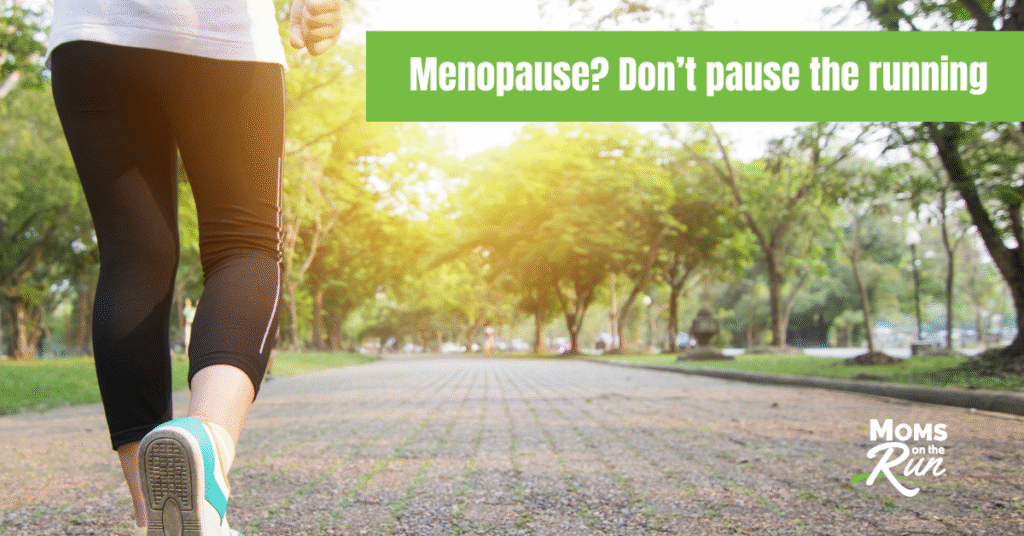For many women, running has always been a source of strength, clarity and community. You may remember the challenges and excitement while running pregnant, and the way running has carried you through past significant changes. When perimenopause or menopause hits, running can suddenly feel different. Hot flashes, disrupted sleep, fatigue and mood swings are just a few of the changes that can impact your training and motivation.
The good news? You can keep running strong through this phase of life. In fact, running can help ease many of the symptoms associated with hormonal shifts. With the right approach, your miles can be empowering — even in menopause.
Let’s break down what’s happening, how to adapt and why running can remain one of your most powerful tools for staying healthy and energized*.
UNDERSTANDING PERIMENOPAUSE AND MENOPAUSE
Perimenopause is the transitional phase leading up to menopause. It typically begins in your 40s, though some women notice changes as early as their mid-30s. This phase can last several years. Menopause itself is defined as the point when you’ve gone 12 consecutive months without a period, usually around age 51.
Hormone levels — especially estrogen and progesterone — fluctuate dramatically during this time. These hormonal changes affect everything from sleep and mood to muscle mass and joint health. It’s no wonder running might feel harder than it used to!
HOW RUNNING FEELS DIFFERENT
You might notice you don’t bounce back from workouts as quickly. Your usual pace may feel like a struggle. Sleep disruptions and hot flashes can leave you dragging in the morning. And let’s not forget the impact of fluctuating mood or increased anxiety.
But here’s the thing: this doesn’t mean your best running days are behind you. It just means your body needs something different now.
WHY KEEP RUNNING?
In additional to the usual benefits of running, running during perimenopause and menopause offers serious benefits:
- Regulates mood: Running boosts endorphins, which help fight irritability and anxiety.
- Supports bone health: Weight-bearing exercise like running helps slow bone weakening.
- Maintains muscle mass: Running, especially when paired with strength training, helps preserve lean muscle.
- Improves sleep quality: Regular cardio can reduce sleep disturbances over time.
- Manages weight gain: Running helps counterbalance the metabolic changes that can come with hormonal shifts.
Running doesn’t just support your body, it supports your mindset, too.
TIPS FOR RUNNING THROUGH HORMONAL CHANGES
- Adjust Your Expectations
Don’t beat yourself up over pace or distance. Focus on consistency and how running makes you feel instead. Some days will be tough, and that’s okay. Give yourself grace and celebrate what your body can do right now.
- Prioritize Recovery
Hormonal shifts can increase inflammation and slow recovery. Build more rest days into your schedule, and don’t skip your cooldowns or stretches. Gentle yoga, walking or mobility work between runs can help reduce stiffness and improve how you feel.
- Strength Train Weekly
Estrogen helps maintain muscle and bone. When it declines, strength training becomes even more essential. Add two to three strength sessions each week to support running performance, prevent injury and protect your bones. Moms on the Run builds strength training into our 1-hour workouts.
- Support Your Sleep
Sleep disturbances are common in perimenopause and menopause. Focus on creating a calming bedtime routine, limiting screen time and cutting back on caffeine. If you run in the evening and it disrupts your sleep, try switching to morning workouts instead.
- Fuel Smart
Your nutritional needs shift during this stage. Prioritize lean protein to support muscle repair, include healthy fats for hormone balance and eat complex carbs to sustain energy. Hydration matters more than ever, especially if hot flashes are part of your reality.
- Listen to Your Body
This is the time to tune in – not push through. If you’re unusually fatigued, take a rest day. If your cycle is irregular and you feel off, scale back your intensity. Perimenopause requires flexibility in your training plan.
YOU’RE NOT ALONE
One of the most powerful things about being part of a moms running group like Moms on the Run is knowing you’re not going through this alone. Many women in our programs are navigating the same changes and supporting each other every step of the way. Whether you’re training for a race or just want to stay active and connected, you’re welcome in our community.
RUNNING TOWARD A NEW CHAPTER
Menopause isn’t the end of something. It’s the beginning of a new chapter. Your body might need different care now, but it’s still capable of strength, growth and endurance. You might surprise yourself with what you can accomplish.
Running in this stage of life is about tuning in, adjusting your mindset and moving forward with confidence. You’ve got this! And, we are with you every step of the way.
Ready to run strong through perimenopause and beyond? Join a Moms on the Run class near you or check out our virtual programs designed for real women, real life and real changes.
*Disclaimer: This article is meant to be a helpful tool on your running journey, but it’s not a substitute for professional medical advice. If you’re dealing with pain or think you might be injured, please consult a doctor or licensed healthcare provider. Always listen to your body and get the support you need to stay healthy and strong.

